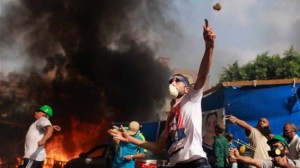 TEHRAN (Tasnim) - The Egyptian government ended hopes for reconciliation with the Muslim Brotherhood�when declaring the group as a terrorist organization after a suicide bomb attack on a police station that killed 16 people, experts said.
TEHRAN (Tasnim) - The Egyptian government ended hopes for reconciliation with the Muslim Brotherhood�when declaring the group as a terrorist organization after a suicide bomb attack on a police station that killed 16 people, experts said.While some experts downplayed the effect of the government's decision, others see it as the end of any hope for the group to return to the Egyptian politics in the future.
"It will not make many changes in the scene as only law can decide on the issue of accusing people of terrorism," said Wahid Abdel-Maguid, an expert at Ahram Center for Political and Strategic Studies.
He added that the government's decision was an administrative one that can be easily challenged.
"It was better for the government to issue a new law or amending the existing one to give itself the power to designate a certain organization as a terrorist one," Abdel-Maguid said, Xinhua reported.
Talks with other countries to list the Brotherhood as a terrorist group need a more solid legal stance, he said.
Meanwhile, Brotherhood leaders described the decision as a blow to any hope for reconciliation and a new excuse for more crackdown on the group's members.
"This decision will blow up any initiative to achieve national reconciliation," Mohamed Toson, a leading Brotherhood member, told state-run Ahram online.
Toson also refuted the government's accusation of practicing violence, saying that through this decision, it only wanted to eliminate its political opponents in the country.
In a statement released on Wednesday, the government said Egypt's terrorism law will be enforced on anyone who participates, finances or propagates the Brotherhood's activities.
The government has ordered police and army forces to protect public facilities and universities against the group's terrorist acts, according to the statement.
Deputy Prime Minister Hossam Eissa said Tuesday's deadly bombing in the Nile Delta city of Mansoura, north of Cairo, as well as other violent acts attributed to Brotherhood members, led to the decision.
The Brotherhood even condemned the bomb attack, which also wounded more than 130 people. The incident is still under investigation, although it was claimed by a Sinai-based Jihadist group, Ansar Beit al-Maqdis.
Since the ouster of president Mohamed Mursi, Brotherhood supporters have staged protests that often turned violent, while students affiliated to the group tried to disturb studying in different Egyptian universities.
Gamal Salama, a professor of political science at Suez Canal University, said reconciliation with such a "terrorist group" is irrelevant.
"The step to declare it as a terrorist group was a public request," Salama said, adding that the important question now is whether the government has the power and tools to implement the decision.
He said the decision is going to have a positive impact on Egypt's "political roadmap."
"All those terrorist attacks only increase the people's determination to go on into the roadmap," said Salama, who expects mass participation in the constitutional referendum scheduled for Jan. 14-15.
Hany el-Gamal, director of the Kanana Center for Political and Strategic Studies, said the government's decision came in a right time especially after the deadly attack in Mansoura.
"If the government hasn't taken such a step, the whole transition roadmap would have been negatively affected," he said, noting that the decision gives Egyptians a moral support and eliminates fears about their participation in the upcoming referendum.
El-Gamal expects a severe confrontation in the coming days between the government and the Brotherhood, especially after the government froze the group's assets.
The government should contact other Arab countries that have signed an anti-terrorism treaty with Egypt to inform them of its decision, he said, adding that Egypt should also ask the UN Security Council to designate the Brotherhood as a terrorist group.
By Tasnim News Agency
The Iran Project is not responsible for the content of quoted articles.










